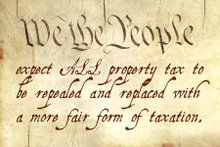 The IRS dismissed a case against a man for not paying taxes because the IRS could not show proof he owed income tax at all. It is also interesting that the story is not picked up by mainstream media yet.
The IRS dismissed a case against a man for not paying taxes because the IRS could not show proof he owed income tax at all. It is also interesting that the story is not picked up by mainstream media yet.
Coupled with the tax revolts popping up all over the country, we are likely on the brink of a true tax revolution in America. Can you imagine the party in the streets when we get property and income tax repealed nationwide?
Connect with your elected congressperson and senator today to demand they join the 63 Congresspersons who are already Fair Tax co-sponsors.
The national Fair Tax Rally will be in Ames Iowa on August 11th. A delegation from Indiana will caravan to Iowa and leave Indiana on August 10th. We need someone from the Indianapolis area with a passenger van who would be willing do drive. More information can be found at:
Fair Tax Indiana & FairTax.org.
The national rally in Ames, Iowa will be attended by Fair Tax author Neal Boortz and several presidential candidates.
Thursday, July 26, 2007
IRS loses challenge to prove tax liability
Posted by
M Theory
at
Thursday, July 26, 2007
![]()
Subscribe to:
Post Comments
(Atom)




1 comment:
This case is a perfect example of the root cause for my concerns regarding the validity of the "Fair Tax".
Before discussing the core of the issue, I'd like to briefly mention the Shreveport case and a recent Illinois case. In Shreveport the IRS lost due to their inability to show where or how an individual is liable to pay the federal income tax.
Recently there was a similar case where a man had failed to pay Illinois state income taxes. The Illinois income tax law specifically references the Federal Income Tax Code as it's justification to collect an income tax. The defendant won the case when neither the prosecutors nor the court could produce a law (the tax code is not law, it's written based upon law) showing that any individual is liable to pay an income tax. When the jury had finally exhausted themselves researching tax law and requesting the law from both the prosecution and the judge - to no avail - they finally agreed that despite personal beliefs that income taxes must be legal (because they all paid income taxes), there was no law being violated by the defendant. They found him "not guilty".
Now let's look at the root cause of creating an income tax. Those of us who follow the income tax debate are well aware that federal income taxes were initiated as a result of the incorporation of the Federal Reserve system, which transfered the management of US currency, monetary policy, and it's issuance to a private conglomerate of banks. One of the results of this was that any federal spending would be sourced from the Federal Reserve as a loan to our government, rather than the traditional method of financing spending through monies collected by the US Treasury in the form of various taxes that did not include a federal income tax.
So why was an income tax created simultaneously along with the Federal Reserve? It was created to finance the interest on US debt that would be owed to the private Federal Reserve banks - which are not all US banks.
And this takes me back to my concerns over the legitimacy of the Fair Tax.
If the current income tax is used to finance the loans issued to the federal government via the Federal Reserve, and if this system is determined by State and Federal courts not to legally hold any individual liable to pay an income tax, the logical conclusion is that the income tax is not valid.
Additionally, from a sound management perspective and an ethical leadership position, it can also be stated that by transfering control of Federal US monies to a conglomerate of domestic and foreign banks, the Federal Reserve system isn't reflective of sound fudiciary responsibility by elected officials who continue to support and promote the system.
With that in mind, when it's apparent that federal income taxes are nothing more than superfluous funds that are used to pay unnecessary and unethical finance charges, how is the Fair Tax fair when it's design replaces the income tax rather than removing it in it's entirety?
Food for thought. Sean Shepherd has responded to similar posts of mine by stating that it would be irresponsible to simply cut off the income tax when certain programs or funding necessities can't simply be eliminated without planning and foresight. I agree, but at the same time, we need to demand full disclosure on how much of the income tax is used to pay finance charges to Fed banks. From there we could move forward and determine a course of action that would responsibly alleviate the income tax burden without simply transfering it from our paychecks to the cash register.
The bottom line is that the Federal Reserve is the problem. It's the core of the income tax issue and our tax problems won't be resolved until US monetary policy is placed back into the hands of the US Treasury and our elected officials.
Think about it.
Post a Comment